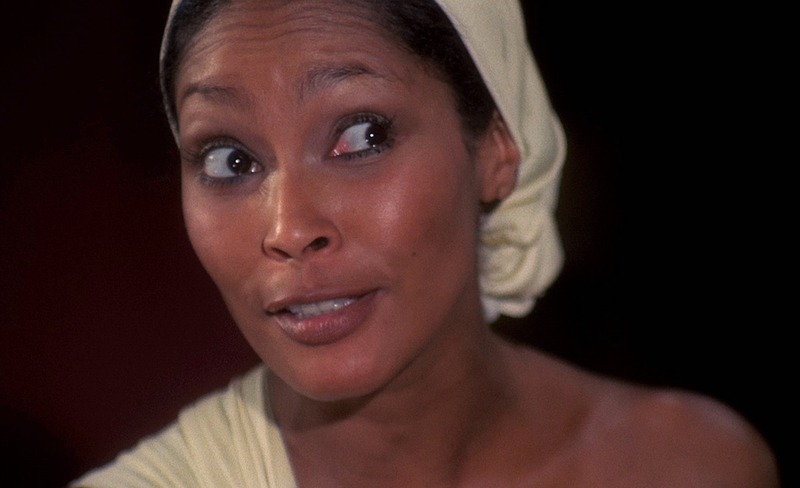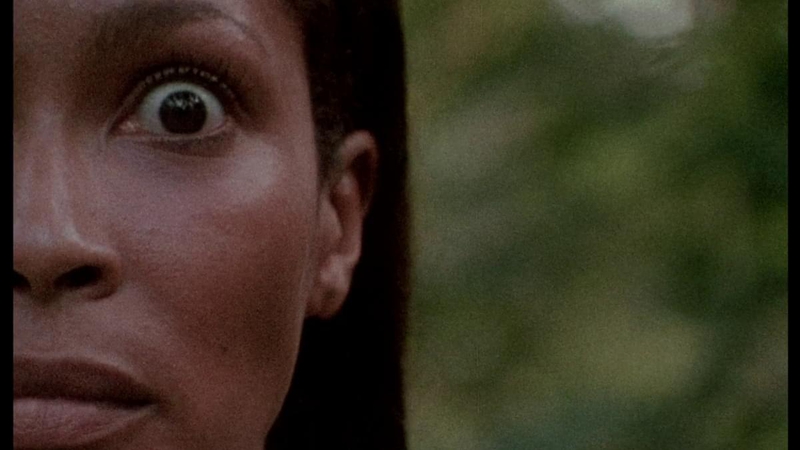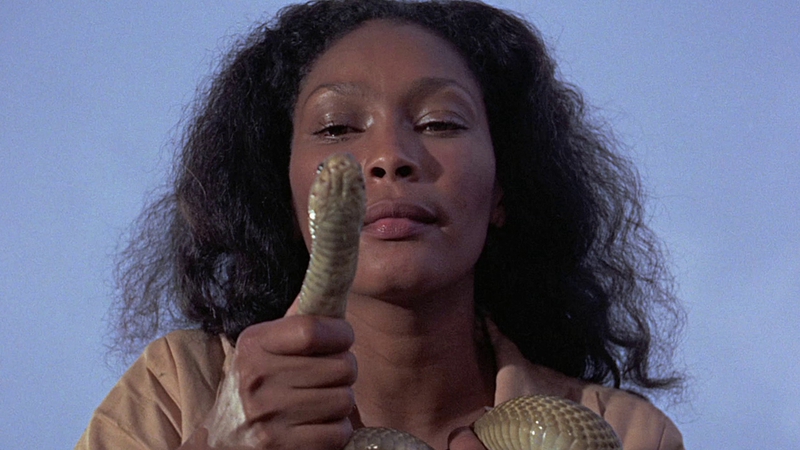In both form and subject, Bill Gunn's Ganja & Hess is the most transgressive Black horror film of (at least) the twentieth century. And because it was among the first films I wrote about on the subject of The Swallowing and taboo appetites, it only seemed appropriate that in the wake of Marlene Clark's passing, I'd dedicate this edition to celebrating the woman behind the character that has inspired so much of my work.
It would be an understatement to say Marlene Clark was an actress ahead of her time. Best known for her legendary role as Ganja Meda, Clark possessed every quality one looks for in a star. She brought a palpable sense of presence and allure to the screen, the capacity to play both sultry and vulnerable, beguiling and predatory, humorous and elegant. And though her filmography showcases undeniable range (it includes a recurring stint on Sanford and Son among several guest appearances on series like The Bill Cosby Show, The Mod Squad, and The Richard Pryor Show), it's her roles in horror films where she truly shines—and more specifically, her roles as monstrous women. That these characters are relatively contained within the broader span of her career is indicative, however, of the well-documented violence associated with misogynoir in the film industry.
As an archetype whose presence in storytelling predates the written word, monstrous women have delighted in tormenting horror fans since the genre's inception and long before it. A litany of books have been written on the subject (which has been given many names), but amongst feminist film critics, there tends to be a split on the matter of what Barbara Creed calls the monstrous feminine: the age-old trope of feminizing the monster. In these texts, the monstrous feminine is frequently interpreted in one of two ways: as evidence of the patriarchal agenda or resistance to it.
These binaries are a bit too tidy for my taste, however. Monsters are always both/and then some, and never is this clearer than when you introduce a racial lens to the subject matter. Marlene Clark's monsters— Lena in Night of the Cobra Woman, Ganja in Ganja & Hess, Caroline in The Beast Must Die— all challenge the ways Black femininity is culturally pathologized, specifically with regard to desirability and appetite. In each film, Clark plays the that which threatens to eat you alive, and I'm absolutely rooting for her to do so in each film.

Night of the Cobra Woman is easily among those films many would dismiss not just as a bad movie- an exploitation film through and through- but "bad representation." In the film, Lena (Clark), a nurse in the Philippines during WW2, is bitten by a cobra that imbues her with vampire succubus-like powers of eternal life and beauty, nurtured on the life force of the men she seduces and devours. The condition of Black femininity in entertainment media is frequently associated with either ungendered or hypersexualized beastliness- the oppositional antagonist necessary to create white femininity's pedestal- and Night of the Cobra Woman definitely exploits those tensions. There's no denying the script's fetishistic and anti-Black exoticism, or its use of biblical allegory to reinscribe the white Madonna/Black Jezebel stereotype, or its stoking of anti-miscegenation anxieties—none of which say anything about Marlene Clark's performance and the complexity she brings to a character written to have none.
The thing about her sexy is that she also exudes a type of poise and self-possession that can seem to transcend the trappings of the stereotype. However intellectually aware I am of the problematic elements, I love watching Lena lay waste to a veritable smorgasbord of shitty, predatory men to whom she has no actual attachment. The men in this film are mere offerings; devotionals to a divinity they're not even cognizant of, and there's something artistically true about the monstrous feminine in that understanding. Her sensuality is a vulnerability she transforms into a tool, a weapon. It's also a challenge to the prescriptive respectability-driven misogyny of Christian ideology and purity culture in general.
Two years later, Clark would go on to star alongside Calvin Lockhart as Caroline in The Beast Must Die. In the tradition of a Whodunnit?, Clark and Lockhart play a wealthy, high-powered couple (with a white assistant!) who invite a number of social-climbing guests to their estate for a weekend. The twist is that Tom, her husband (a big game hunter), suspects each of their guests of being a werewolf and has planned the visit to coincide with a full moon so that he might discover the beast and kill it.

Clark's style and elegance are on full display in this role, unique for the genre in that the two Black characters are also the highest class. As a character, Caroline is beloved by her husband but annoyed and critical of his obsession with hunting. That she accidentally becomes infected and Tom must kill her is presented as a tragedy in the film.
Again, the character illustrates a femininity in excess: a Black woman wanting more than what she's been granted, for which she's supposed to shut up and be grateful. Writing on The Beast Must Die and Vampira, Dr. Robin R. Means Coleman describes their "common themes of [showing] Black women as desirable and worthy, but also stricken with a taint that threatens their men" — an observation equally true of Clark's character in Night of the Cobra Woman, and certainly the role she's most known for in Ganja & Hess, which famously uses vampirism as a metaphor for addiction.
I've written before about werewolves being monsters of transformation, but they're also monsters of contagion. Like vampires, zombies, and even cobra-women, one becomes a werewolf through an infected bite. We say someone's "caught the bug" when they become preoccupied with something; when hunger overwhelms their attention. Caroline is "desirable and worthy" and her death tragic, but she nags Tom; makes demands of him.
The taint to which Dr. Coleman refers is dissatisfaction. An appetite unfulfilled. It's a taint because "good" "virtuous" women- like the "enduring women" of Blaxploitation films- only seek to satiate the desires of others: those of her man, her children, her community. Her own desires though? Monstrous.
Is there a readily apparent misogyny in the perspective that a woman falls from grace when she reveals herself as a being with needs? Absolutely. But perhaps because of this misogyny, there's a real pleasure in these monsters that are so threatening to white supremacist patriarchy, even as they're still tormented beings. Their fiction gets closer to the truth of experience than truth can.

Clark's iconic role in Ganja & Hess also depicts a Black woman whose monstrousness is similarly defined by an essential unwillingness toward self-denial. Canonical to those of us preoccupied with the intersections of Black feminism and horror films is a scene I've written about before, in which Ganja describes "a very decisive day" as a child when she consciously embraced the "disease" projected onto her- which she understands as the disease projected to Black femininity- and decided for herself that she was "valuable." She claims that on this day, she promised herself: "Take whatever steps had to be taken. But always take care of Ganja."
The scene follows an initial impression of the character as flagrant, unapologetic, overbearing. She arrives in media res, and when Hess asks what she wants, she replies, "Money." As much as bloodthirst, sexual desire, and the addict's craving are overlaid in the film (as in the general vampire mythos), so too, as Mal White identifies, are bloodthirst and moneyhunger. Ganja is driven by a core dedication to herself that directly contrasts all the constructions of Black femininity deemed acceptable by the interlocking power relations of white supremacist capitalist patriarchy. Because she seeks to nurture herself before all others, she embodies a defiance definitive of the monstrous femme noir; a dedication that distinguishes her character's evolution from Hess's.
While Hess is subsumed by the guilt and horror of what he becomes (and what he transforms Ganja into), Ganja- though not without struggle- comes to enthusiastically embrace her new nature and its various delights. For her, monstrosity is the condition of liberation.

Ganja is my favorite character of all time: a lighthouse in my work and general approach to life. So clearly does she elucidate the experience of Black femininity under material social conditions past and present, emblematic of the truth that to terrorize power is to claim power—but that said claim will beget a certain unprotectedness.
In 2000, Clark was interviewed by Fango's Chris Poggiali. Their conversation appeared in issue #191 and featured some illuminating details about Clark's career as a burgeoning genre star and the horrors behind the scenes.
Apart from the general lack of publicity for many of her films and the endless renaming, recutting, re-releasing, she alludes to a persistent, grating standard of compromised safety across multiple productions. While her most disturbing account concerns a scene cut from 1974's Black Mamba where she was nearly raped on camera, she also states plainly that Robert Downey "lied to all of us" about nude scenes in Putney Swope that saw her more exposed than she believed she would be. Then, upon confessing her misgivings about the screenplay for Night of the Cobra Woman, she tells of the unprofessionalism on set and the snake handler who "[kept] forgetting to milk the cobras."
"The whole thing was strange from the start," she goes on. "I mean, they brought me to the Philippines to play a Filipino! Now, please, I want somebody to explain this to me because I've never understood that!" And without missing a beat: "All the Filipino actresses were too smart to walk into a room full of cobras."

It's clear from such interviews that Clark was every bit as charming and astute as her performances onscreen would lead you to believe. She's also self-deprecating in a way I hope wasn't indicative of internalized self-blame. Though her acting career was short (she notes how "the roles dried up" in the '80s) and the horror segment of it shorter, she left an indelible impact on the genre. Of Ganja, she said she "couldn't wish for a better character," describing her as "a collection of contradictions" while noting how "rewarding" the role and partnership with Bill Gunn and Duane Jones was.
Despite her brilliance, talent, undeniable beauty, and yes, her endurance, Clark struggled in an industry and world that simply was not ready for her and, to this day, does not know what to do with the complexity of a Black woman. But that complexity persists in her monsters— the power in their contradictions, their hunger, their refusal to deny themselves — and the performances of the woman who brought them to life.
Ganja is a love letter to Black women, and that type of love is eternal.






